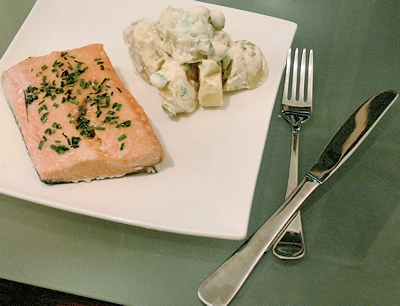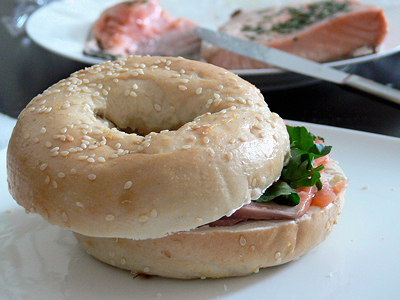Slow-Roasted Salmon With Endamame Potato Salad
I read about slow roasting salmon last week to coincide with my new obsession with the fish markets - last week alone I made three trips. The recipe had me intruiged, especially as by 'slow' it meant a whole 17 minutes. It described the texture of salmon cooked at a very low temperature for this short time as melt-in-the-mouth and luscious. I don't like the texture of baked salmon so I couldn't wait to try this method - and now I won't be cooking salmon any other way.
Salmon and potatoes are a wicked combination, as are salmon and sour cream or creme fraiche, so I decided to make a simple sour cream potato salad on the side. Endamame are a delicious and healthy addition.
Use a whole salmon fillet (usually 250g-400g each) even if just making one serving as cutting a fillet in two will dry it out, and enjoy the leftovers like I did - lox with a twist - piled high on a bagel, with cream cheese and watercress. Simply incredible.
Slow-Roasted Salmon
1 salmon fillet (see above)
A handful of chopped chives (optional)
Olive oil, salt, pepper
Preheat oven to 110C. Clean the salmon and pat dry on paper towel. Place on a baking tray lined with baking paper. Brush all sides of the salmon with a tiny amount of olive oil, and season generously. Pat chopped chives into the top of the fillet. Place in the oven and cook for 17 minutes exactly. Remove, enjoy.
Endamame Potato Salad, serves 1
Two small potatoes, peeled and washed
Handful of endamame in the pod (available in the freezer at Asian supermarkets)
Sour cream or creme fraiche
Dijon mustard
Salt, pepper
Place potatoes on a plate and microwave for 3 minutes. Flip potatoes over and microwave for 3 more minutes.* Remove, slice and season. Meanwhile cook the endamame - 2 1/2 minutes in the microwave - and pop them out of their pods into a bowl with the potatoes. Add a good dollop of sour cream and a teaspoon of Dijon mustard and mix. Serve with the salmon.
* This is a quick and no-fuss way of cooking potatoes; boil or bake them if you prefer.
Salmon and potatoes are a wicked combination, as are salmon and sour cream or creme fraiche, so I decided to make a simple sour cream potato salad on the side. Endamame are a delicious and healthy addition.
Use a whole salmon fillet (usually 250g-400g each) even if just making one serving as cutting a fillet in two will dry it out, and enjoy the leftovers like I did - lox with a twist - piled high on a bagel, with cream cheese and watercress. Simply incredible.
Slow-Roasted Salmon
1 salmon fillet (see above)
A handful of chopped chives (optional)
Olive oil, salt, pepper
Preheat oven to 110C. Clean the salmon and pat dry on paper towel. Place on a baking tray lined with baking paper. Brush all sides of the salmon with a tiny amount of olive oil, and season generously. Pat chopped chives into the top of the fillet. Place in the oven and cook for 17 minutes exactly. Remove, enjoy.
Endamame Potato Salad, serves 1
Two small potatoes, peeled and washed
Handful of endamame in the pod (available in the freezer at Asian supermarkets)
Sour cream or creme fraiche
Dijon mustard
Salt, pepper
Place potatoes on a plate and microwave for 3 minutes. Flip potatoes over and microwave for 3 more minutes.* Remove, slice and season. Meanwhile cook the endamame - 2 1/2 minutes in the microwave - and pop them out of their pods into a bowl with the potatoes. Add a good dollop of sour cream and a teaspoon of Dijon mustard and mix. Serve with the salmon.
* This is a quick and no-fuss way of cooking potatoes; boil or bake them if you prefer.





3 Comments:
my mind is a steel trap... the things i remember....
my father always said that the best cooking is an equal combination of art and science. You need to underdstand the chemistry and physics as much as you you do the creative aspect...balancing acids and bases, understanding the effect of heat on plant and animal cells.
this is particularly true when cooking fish - and the science part is that if you cook fish at too high a temperature the proteins in the flesh start to break down and this is what makes it dry and chewy.
when we do our poached salmon at Christmas the water it is poached in never actually boils - the moment you see bubbles you know its gotten too hot...i think the max temperature the flesh should reach is about 68C or thereabouts. So the whole poacher goes into the oven, not on the stove top.
forget this rubbish about having to cook the buggery out of it in order to kill the salmonella - if you have to worry about salmonella then your fish is off and/or you need a new fish monger (and you should stop eating sashimi too)
Do you know, I said the same thing today. I'm curing a salmon as I type (first time) and was a bit anxious, and realised you're fine if you're buying quality fish and that's what should be reiterated.
curing as in gravlax?
so easy, so delicious - I can't believe more people don't do it.
don't be frightened about the amount of salt/sugar you need - I baulked the first time adn thought it would HAVE to render it inedible...but it's all about the SCIENCE!
the salt and sugar draw the liquid out - they don't get absorbed by the flesh so it doesn't end up tasting salty/sweet.
but make sure you don't leave it too long! Couple of Christmases ago we forgot about it, didn't remove the salt/sugar in time and it turned into leather! could have used it to re-sole your shoes!!!
Post a Comment
<< Home